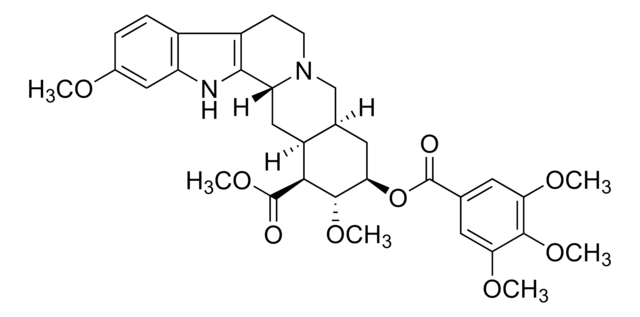03762
2,6-Di-tert-butyl-4-methylphenol
tested according to Ph. Eur.
Synonym(s):
Butylhydroxytoluenum, 2,6-Di-tert-butyl-p-cresol, BHT, Butylated hydroxytoluene, Butylhydroxytoluene, DBPC
About This Item
Recommended Products
Agency
USP/NF
tested according to Ph. Eur.
Quality Level
vapor density
7.6 (vs air)
vapor pressure
<0.01 mmHg ( 20 °C)
autoignition temp.
878 °F
bp
265 °C (lit.)
mp
69-73 °C (lit.)
application(s)
pharmaceutical (small molecule)
SMILES string
Cc1cc(c(O)c(c1)C(C)(C)C)C(C)(C)C
InChI
1S/C15H24O/c1-10-8-11(14(2,3)4)13(16)12(9-10)15(5,6)7/h8-9,16H,1-7H3
InChI key
NLZUEZXRPGMBCV-UHFFFAOYSA-N
Gene Information
human ... CAPN1(823)
rat ... Capn1(29153) , Nos1(24598)
Looking for similar products? Visit Product Comparison Guide
Application
- Quantitative analysis of residual butylated hydroxytoluene and butylated hydroxyanisole in Salmo salar, milk, and butter by liquid chromatography-tandem mass spectrometry.: This study provides a quantitative analysis of residual 2,6-Di-tert-butyl-4-methylphenol (BHT) and butylated hydroxyanisole (BHA) in various food products. The research highlights the presence and concentration of these antioxidants in fish, milk, and butter, demonstrating their widespread use in food preservation (Galal et al., 2024).
- The key factors of solid nanodispersion for promoting the bioactivity of abamectin.: This research investigates the use of BHT in solid nanodispersions to enhance the bioactivity of abamectin, a widely used insecticide. The study identifies key factors that improve the stability and effectiveness of the formulation, suggesting applications in agricultural biotechnology (Ding et al., 2024).
Signal Word
Warning
Hazard Statements
Precautionary Statements
Hazard Classifications
Aquatic Acute 1 - Aquatic Chronic 1
Storage Class Code
11 - Combustible Solids
WGK
WGK 2
Flash Point(F)
260.6 °F - open cup
Flash Point(C)
127 °C - open cup
Personal Protective Equipment
Choose from one of the most recent versions:
Already Own This Product?
Find documentation for the products that you have recently purchased in the Document Library.
Customers Also Viewed
Our team of scientists has experience in all areas of research including Life Science, Material Science, Chemical Synthesis, Chromatography, Analytical and many others.
Contact Technical Service






